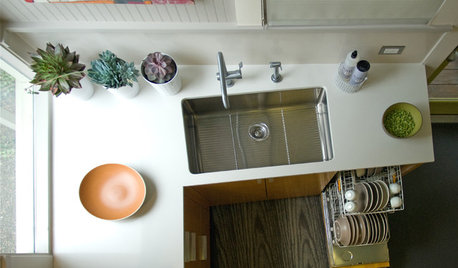sick of eggshells
Has anyone else had it with composting eggshells? I crush them as fine as I can but they still are intact when the rest of the compost is finished. I end up with white flecks all over the garden. Brown eggs, when I'm lucky enough to get them, at least don't show as much.
Yesterday I snapped and threw some in the garbage. It felt so wrong....but it felt so good.
Comments (80)
annpat
14 years agoflora, relax. It's an inexact process which will tolerate some deviation. The instrument may be steel, ceramic, glass or plastic, although plastic sometimes results in the egg breaking into 1/3 and 2/3 sections. Those sections will compost, though; do not throw them away. The time and temperature of the kitchen, likewise, may vary wildly. The period between bisecting the shell and getting it into the compost is up to the cook. You can put the egg halves directly into the compost bucket if your bucket is near the stove or if you're not adverse to taking a few steps midway through the omelet.
flora, I'm frankly more than a little surprised that you asked if milled eggshell bread could be composted, you being someone I usually think of as sensible. It doesn't matter a whit if someone makes their bread out of ground, milled, deionized, oven-baked, boiled-in-vinegar, microwaved or stomped eggshells, bread is a no-no in the bin. Well, I supposed one could compost Milled Eggshell bread if they installed some sort of commercial dehydrator in their bin. It's the moisture in the average bin that causes the problem.P POD
14 years agoBaking is done to kill bacteria in an attempt to sterilize the shells and to prevent feeding salmonella (and other bacteria) to your flock.
Chickens, as well as wild birds, like to eat crushed egg shells. It helps them replenish their calcium during periods of egg laying. Thick-shelled eggs won't break easily if accidently stepped on by the bird as she leaves the nest. A broken egg won't hatch..... so there's a bit of evolution going on with birds eating egg shells.
Related Professionals
North New Hyde Park Landscape Architects & Landscape Designers · Walnut Landscape Architects & Landscape Designers · Columbine Landscape Contractors · Damascus Landscape Contractors · Darien Landscape Contractors · Live Oak Landscape Contractors · Merced Landscape Contractors · Palm Beach Gardens Landscape Contractors · Shirley Landscape Contractors · Washington Landscape Contractors · Centennial Decks, Patios & Outdoor Enclosures · Lansdale Decks, Patios & Outdoor Enclosures · Northglenn Decks, Patios & Outdoor Enclosures · Salisbury Decks, Patios & Outdoor Enclosures · Vero Beach Decks, Patios & Outdoor Enclosureshamiltongardener
14 years agoI'd love to try the "recipe" above to dissolve my eggshells quickly and water them into the soil.
I am a bit wary of adding vinegar to the soil, even diluted.
Is it possible I could add something to the eggshell water after the shells have dissolved like baking soda in order to bring the pH closer to neutral? If so, are there any chemistry people out there who could tell me a ratio of vinegar to baking soda?
david52 Zone 6
14 years ago1 teaspoon in a glass should do it. It will fizz a bunch, which is fun to watch.
pennymca
14 years agoHamiltongardener...
After bopping around the net this morning, I'm going out on a limb to suggest that the pH might be sort of neutral. I don't have any litmus paper to test my current little experiment here but here's what I found out:
The vinegar is acidic, the egg shell is alkaline. When the eggshell dissolves in the acid (I think you need more than 1 tsp--perhaps enough to cover your crushed eggshells) you are left with something called calcium acetate. (Free calcium ions floating around in the vinegar.) If left exposed to the air it will form crystals.
http://www.rocksforkids.com/RFK/Experiments.htm
When I looked up the pH of calcium acetate it was listed on one site as 7-8.
The link below is to a guy doing an "eggs-periment" on tv using hydrochloric acid to do the dissolving quickly. Not that we have or want to use HCI but fun to see, nonetheless.
It seems to me that if you release the pure calcium from the calcium carbonate of the eggshell and dilute it with water it would be more easily taken up by the plants.
P.S. All of my eggshells have gone/do go into the compost pile in an "as is" condition. They don't bother me at all. I got off on the dissolving thing as a possibility for someone who doesn't like seeing eggshells in their compost or in the garden.
Here is a link that might be useful: Naked eggs, speeded up.
swanz
14 years agoI scratched in lots of crushed eggshells directly around my tomato plants a couple years ago. It was the 1st time I had no tomato hornworms. My theory being all the many birds that showed up to eat bits of shells also ate any hormworms before they had a chance to damage the plants.
rj_hythloday
14 years agoI wanted to mention that I get my eggs from a local farmers market as much as possible. Not only do they taste great, they are usually less than a week old, some times same day - They are also much thicker shells. Their are several people that bring eggs $2.25,3.50, and 3.99. I buy as many of the 2.25 eggs as I can when they are available, cheaper than egg lands best and there's no comparison to the taste.
lindag
14 years agoI nuke them in the microwave then into a spice grinder, have been sprinkling on my garden , was also wondering if I could feed the ground up egg shells to my goats and if they would absorb the calcium?
thanks lindagcurtludwig
14 years agoVinegar does a reasonably good job of keeping japanese beetles off bean plants. I spray it all summer, usually every day. Maybe you could spray the mix on the plants, the rain surely washes it into the soil but I've never had any problem with it being an herbicide...
annpat
14 years agor.j., Eggland's Best buys their eggs from Decosta Eggs in Maine where sick chickens are heaved into garbage cans to suffocate, if they're lucky, or get their heads kicked off by sadistic employees, if they're not.
rj_hythloday
14 years agoNot good to hear, I'm glad I'm getting my eggs local. Plus they taste great. I can't wait to have my own yard where I can have a chicken coop. Not to mention the chicken litter to put in my compost pile!
annpat
14 years agoOh, I'm really sorry that I wrote that last night. Forgive me. It's just been on our news.
david52 Zone 6
14 years agoI just heaved, in the trash, the two dozen boiled eggs left over from the Easter Fête. Why? You may ask, aghast at the thought of non-composting a compostable. Let me list the reasons:
1) Nobody here likes boiled eggs, and after looking enticing, there in their colorful array of greens and yellows and blues, not a one was consumed.
2) These eggs, two weeks ago, were the last ones on the grocery shelves when we were invited on the Sat to the Easter bash on the Sun, and were suspect re expiration date.
3) After hard boiling, they sure smelled of sulfur, bringing to mind that expiration date thing again.
4) I got easier ways of adding sulfur to my garden than stinky eggs - like from a sack full of sulfur.
5) You should have seen the size of the skunk on top the compost pile last evening.
hamiltongardener
14 years agoHamiltongardener...
After bopping around the net this morning, I'm going out on a limb to suggest that the pH might be sort of neutral. I don't have any litmus paper to test my current little experiment here but here's what I found out:The vinegar is acidic, the egg shell is alkaline. When the eggshell dissolves in the acid (I think you need more than 1 tsp--perhaps enough to cover your crushed eggshells) you are left with something called calcium acetate. (Free calcium ions floating around in the vinegar.) If left exposed to the air it will form crystals.
Thanks Penny,
I think you might be right. I put a little vinegar in a container with my eggshells and they started dissolving for about a day. I've left it since Monday but there has been no further dissolving that I have been able to see. So tonight, I drained the vinegar off the eggshells and carefully mixed a little baking soda into it. Nothing, not even fizz. So I mixed a little more. Still nothing. The vinegar was cloudy and full of eggshell powder, I could see teeny tiny bits of the brown eggshells still.
I'm guessing that the eggshells did bring the vinegar to neutral and once it reached that state, the vinegar was not acid enough to keep dissolving the eggshells, and that's why baking soda would not even get it to bubble. Think I'm right?
I took that little bit of vinegar, mixed it with a full watering can of water, and put it on one of my garden beds. I've added more vinegar to the eggshells that were left over. They are now happily bubbling away and dissolving right before my eyes with the fresh vinegar.
californian
14 years agoIf you keep your eggs in the refrigerator you can use them for weeks past the expiration date. I have never found a rotten egg in my whole life, even ones with hairline cracks in them.
This idea of processing egg shells seems a ridiculous waste of time, energy, and money to me. Just throw the shells in the bottom of the planting whole and smash them a few times with a shovel, or throw them on the surface of the dirt just before you rototill. Who cares if you see some specks of white. I have probably put over a thousand egg shells in my garden and I don't see any of them now.hamiltongardener
14 years agoIt's not that I haven't already done that. I've been concentrating on one raised bed at a time and put lots of eggshells into them. They are happily speckled and I don't mind that.
But from what I understand, it takes over a year before that calcium becomes available to the plant. I have started on a new bed this year and want to give a try with having the calcium immediately available. It's mostly an experiment, I'm sure my garden will grow anyway. I just want to give it a try.
rj_hythloday
14 years agoI'm going to give it a try also when my toms and other fruits are blossoming and would benefit from a calcium boost. Not to mention I'm on the east coast and the constant rain washes the calcium out and leaves a surplus of potassium which is not good when the ratio is out of whack. As I learned from Steve Solomons Organic Gardeners Compost.
Here is a link that might be useful: Steve Solomons Organic Gardeners Compost
bug_girl
14 years agoIf I see some egg shells in the ready compost, I mix and crush and use it anyway. It will breakdown in a few more days.
anewgarden
14 years agoI usually hang out over at vermicomposting-just peeking around here to see what's up.
This egg shell thing is interesting!
Personally I can't get enough egg shells! If I had 2 dozen a week I'd be happy. I ask friends for them.
Way before I had compost and way way before I had a worm farm, I used as many egg shells in my garden as possible because my grandmother did. She'd rinse them, break them up a bit, but not too much, and then spread them around under her roses. Her roses were amazing. She said the shells kept the slugs at bay, and that they were good for the flowers. She told me she rinsed them so mice or rats didn't seek them out. Made sense to me.
So if I put them outside I wash them off in hot water. If I put them in my INSIDE worm farm I don't. The worms eat up all the bacteria. I think the shells in both the indoor and outdoor worm farms are gone before the large bits around my roses, in my tomato pots and in my non-worm compost bin are.luckygal
14 years ago"also wondering if I could feed the ground up egg shells to my goats and if they would absorb the calcium?"
Lindag, you can certainly feed egg shells to your goats altho I wouldn't feed too many at a time and would dip them in boiling water first (eggshells, not goats). Back a few decades ago Adelle Davis, the guru of natural nutrition, suggested ground egg shells from hard cooked eggs be used in baby formula as a source of calcium.
Years ago when I had lots of house plants I used to soak eggshells in water and give the plants a treat. It was a bit smelly and I didn't use vinegar but it was supposed to be good for the plants.
I just played with all my compost today and there are still eggshells on the bottom layer from last year. Smashed a few with my shovel and ignored the rest!
albert_135 39.17°N 119.76°W 4695ft.
14 years ago@* petalpatsy TN7a...Fri, Apr 24, 09 at 14:06 " ... Was that Worf? ..."
I don't understand.
rj_hythloday
14 years agoCan any one comment that has dissolved egg shells in vinegar?
I put about 3 inches of crushed egg shells in a 1 gal ice cream bucket. Covered w/ apple cider vinegar. 2 weeks later, I still have alot of egg shells. Do I need to drain, save and repeat?
hamiltongardener
14 years agoI put about 3 inches of crushed egg shells in a 1 gal ice cream bucket. Covered w/ apple cider vinegar. 2 weeks later, I still have alot of egg shells. Do I need to drain, save and repeat?
I've run into the same problem, the eggshells wouldn't dissolve. I drained them and diluted the vinegar and watered it into the raised bed, then tried it again with fresh vinegar. Still did not dissolve the shells so I drained, diluted and watered again, then I put the leftover eggshells into the compost. They were soft, but not dissolved.
Hopefully I pulled enough calcium out of them to have it available to the bed I watered this year.
lisascenic Urban Gardener, Oakland CA
14 years agoThere's a traditional method of decorating easter eggs where you draw on a brown egg with molten bees wax, and then dip the egg in vinegar. You remove the egg, and rub the shell with a cloth, and a little bit of the shell sluffs off. Re-submerge in vinegar, rub surface of egg some more, and in no time at all, the brown outer shell of the egg is removed.
Of course, I can't seem to find directions for this anywhere on the internet. (Darn those non-internet-using Ukrainian grannies!)
So maybe what's missing from this vinegar egg dissolving operation is mechanical abrasion?
rj_hythloday
14 years agoAfter posting the wife wanted to take the oldest to the movies. So I used the opportunity to do something I wouldn't do while she was at home (like the time I turned our shower into a paint booth while modding a pc;-)
I drained the shells and saved the used up vinegar. Put the shells on my pizza air pan
{{gwi:282823}}
Baked it in the barbecue at 400° for about 20 minutes.
This time they were nice and charred, unlike the time I baked them in foil.
Next I added some new vinegar, and put it in an old blender we don't use any more to make the pieces much smaller. I used the blender out doors, whew it stunk!
Then put all this back in the ice cream bucket to sit for a few weeks.
Like I said, good thing the wife was out, cause it stunk!
gringojay
14 years agoCalcium (Ca) that is soluble for real time plant uptake is made from the eggshells' calcium carbonate this way:
(a) clean crushed eggshells are soaked in 5% white vinegar; at ratio of 50 grams eggshell with 1 Lt. 5% vinegar
(b) soak blend 24 hours
(c) simmer 1 hour (avoid aluminum pots), you do not try to evaporate fluid
(d) filter off the solid & retain the fluid extract of Calcium acetate
(e) then dilute the filtered extract with enough water to make 1 Lt. of solution (for every 50 gr. eggshell started with); this dilution = approximately 15 gr. Ca/Lt.
Foot Note: this is also an old time form of Ca supplement for human consumption; for human usage roasting the shells first to destroy potential salmonella bacteria contamination might be applicablepkapeckopickldpepprz
14 years agoI had 2 dozen eggs past the expiration date just a month ago. One said EXP 1/2009 the other said Mar 2009. I boiled them up and ate them and I am alive and kicking. They even tasted normal. I do use the trick of sticking a pin in the round not point end of the egg which releases the sulphur gas while boiling and the main reason is to keep the yolk from turning a green color. Maybe releasing this sulphur gas is the reason it didn't taste any different.
Now sisnce I am eating eggs regularly I rarely have a dozen last more than a week.
northern_cutie
14 years agoHere's how I compost egg shells, works every time.
Take the egg shells
Toss them in the trash
Take one unflavored Tums, and crush it finely
Mix some of the tums in with the soil around the plant's roots
Have a nice day!kikifoow
14 years agoVinegar is a pesticide? I guess maybe, at a strtch you could call it a pesticide, but certainly not in the realms of a commercial one! Vinegar has been used for centuries as a wound cleaner with no ill effects, we put it in our food,it makes a salad great.... how can you go nuts and say it never hits your garden as it is a "pesticede" like its as bad as DDT or Agent Orange or something..... Dilute it with some water and all you are doing is changing your pH a bit..... and maybe annoying/ killing some pH sensitive bugs!.. sheesh!
Never knew egg shells could help as pest eradication. I assume the zapping/ baking/ toasting is ONLY for purposes of "sterilizing" the eggshell?
eno
13 years agoI save every eggshell like a treasure. It drives my husband nuts. I use them around my hostas and other plants plagued by slugs. They are the best slug replant. I put them in a small cardboard box under the sink and save them up for when I need them. They are great for your plants and the slugs hate them. Why work so hard on ways to disguise and crush up fine? I use my hands and find it kind of satisfying crushing them.
kqcrna
13 years agoI sometimes throw the shells into the compost, other times I just toss them in my flower beds, hoping that the sharp edges will slice up some slugs.
My grandmother used to save pickle juice and dump in in the soil under her hydrangeas to make them blue. She might not have known much about pH per se, but she knew that the vinegar in in pickle juice made the flowers blue.
Re: comments that egg shells don't raise help calcium level in the soil because it takes so long to work: who cares, if the option is to toss the shells in the garbage can.
Karen
toxcrusadr
13 years agoWell put Karen, building and maintaining healthy soil is not an instant gratification thing, it's a long-term process.
dorisl
13 years agoI think that if you soil has a higher PH, that could be why the egg shells never seem to dissolve? Prolly soil where the egg shells disappeared is a bit more acidic that the soil where they don't?
gratefulgardener3300
13 years agoI break the eggshell on the very bottom leaving as much in tact as possible. After removing the egg I clean and dry the shells. After all 12 have been used I put the shells back in the carton and return it to my supermarket. Most of the time I will get a refund or another dozen of eggs and I start the cycle all over again.
jollyrd
13 years agorootdoctor said " It seems to work well to keep slugs off the plants. "
That's what I put them in compost in the first place -- to create a texture that is unpleasant for slugs. The slower they decompost - the better!!!
terran
13 years ago* Posted by albert_135 *
on Wed, May 6, 09 at 11:16
@* petalpatsy TN7a...Fri, Apr 24, 09 at 14:06 " ... Was that Worf? ..."
"I don't understand."
Albert,
¿Can you spell S*T*A*R T*R*E*K ?
Worf: definition - fellow that can crumble eggshells with a look.
Terran
Here is a link that might be useful: Worf
woodsworm
13 years agoA friend in England shared this trick. Collect them in an old pan (like an aluminum pie plate) and store them in the oven as you collect them. Everytime the oven is on, they dry out more. Don't leave them in on a really high temp or they will smell and the fire alarm will go off and you have a bad situation. But it dries them out, then you can crush them with your hand very easily when you add them to the worm bed or compost bed. Works for me.
Giovanni Curcio
9 years agonot sure if this was mentioned in a comment ...<< i wash my eggshell in warm soapy water, and i heard 10-20sec in microwave to kill any bad bacteria also>> ..
toxcrusadr
9 years agoGiovanni, yes that would work but is only necessary if you are feeding the shells back to the chickens - to prevent salmonella. If you are composting, do not be concerned about bacteria. Pathogens will not survive in a well managed compost pile, and we don't eat the compost anyway. :-]
What a train wreck this thread was! I just started reading and had to switch to skimming because it was soooo long.
The whole idea of dissolving shells in vinegar to make calcium phosphate was bogus to begin with. Shells are 95-97% CaCO3 (according to Wiki) so where is the phosphate coming from?
I stopped adding shells to my compost when my soil tests showed soluble calcium as VERY HIGH. Of course I live on limestone-based clay soil so it was not a long trip. :-D
lazy_gardens
9 years agoI toss them in the trash ... it's too much work and my dirt is loaded with calcium.
If I dump them in the compost heap, the birds take them and drop them all over the yard.glib
9 years agoThat's right, Tox. I bake them in the oven briefly, then grind them, then put them in my smoothie for some Ca without the P. But it takes a month to go through 3 shells, in practice, I grind a dozen for a few month supply of Ca supplement.
nancyjane_gardener
9 years agoRinse, dry, pulverize, add to compost or around plants. If you are feeding to chickens/birds be sure they are pulverized or they (chickens) might get the great idea that eggs are yummy and start eating their own! I had to get rid of my chickens because of that! Nancy
Yoshimi Dragon
8 years agowhat is the consensus on washing then? I have always rinsed mine and am just experimenting with drying. Yesterday's toaster oven experiment stunk horribly because I black roasted them, so that first batch went outside.
toxcrusadr
8 years agolast modified: 8 years agoI never rinse them, don't see the need. The amount of protein in that thin wet coating is insignificant.
[EDIT: Note, when I did compost them (I no longer do, due to high soluble Ca in the soil), I just crushed them up a bit with my hand and put them in the kitchen compost bucket. I never rinsed, dried or baked them. I can see how baking to dry might be good if you're going to pulverize them for use on slugs. Otherwise I don't see the point.]
forever_a_newbie_VA8
8 years agoI dig a little hole around the plant, bury the egg shells in, replace the soil, and use the little hand shovel to smash the soil a couple times. The shells blend in with the soil all right. The calcium might only be available to the soil or plants after a long time, but that is OK with me. In long time it will do good to the soil
rayzone7
8 years agolast modified: 8 years agoFirst, I do a cursory rinse in the sink and then store them in an air-tight container in the garage. When the container is full, I do a rinse-only cycle in the dishwasher. Then, I scrape out the inside of each one with a narrow chisel from a special set I honed to match the curvature of the interior of an egg. Then, I wash each one by hand with a mild detergent and place in the oven on "warm" for 72 hours. I then roughly crumble by hand and return to the oven for another 72 hours. Next, I grind them into a fine powder, put in a pot and just cover the powder with vinegar. This soaks for 48 hours. Next, I add 1 qt of water, bring to a rapid boil, and simmer for 6 hours. When it cools to room temperature, I filter out any remaining solids, dilute 10-1 and use as a foliar spray.
Or, I just throw them out back unwashed, uncrushed and forget about it.
toxcrusadr
8 years agoYou guys are killin me. rayzone, you left out the essential step - in between the detergent wash and oven drying - of placing them between layers of cardboard for several months, followed by soaking for 3 days in de-chlorinated water amended with molasses and aerated with an aquarium stone. This must be done under a full moon. Then drain and allow to age naturally in partial sunlight for 3 months to ensure bad bacteria are removed. Bury them in trenches between your garden rows. Next year, dig them up and THEN proceed with the oven drying.
















lynxe